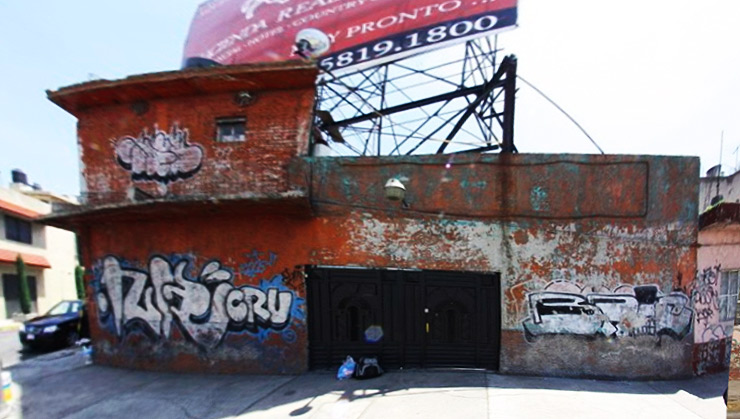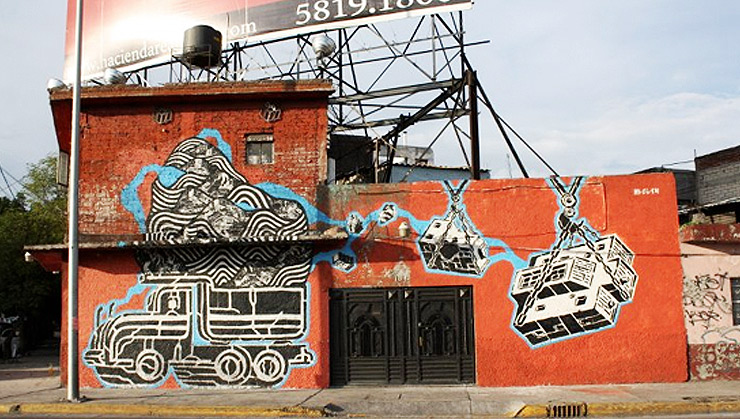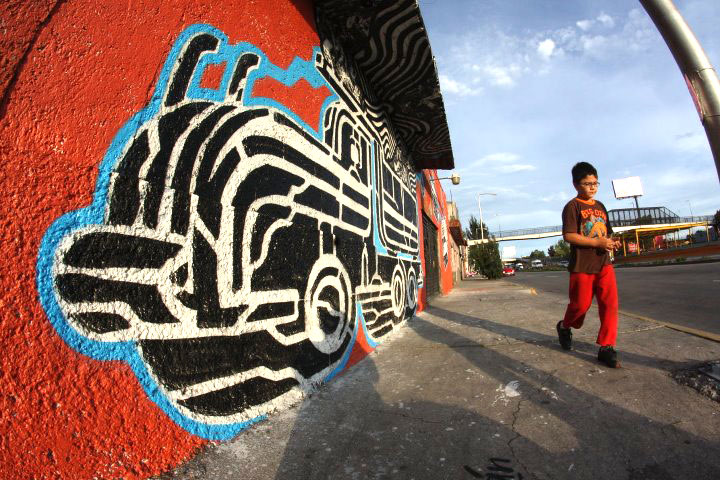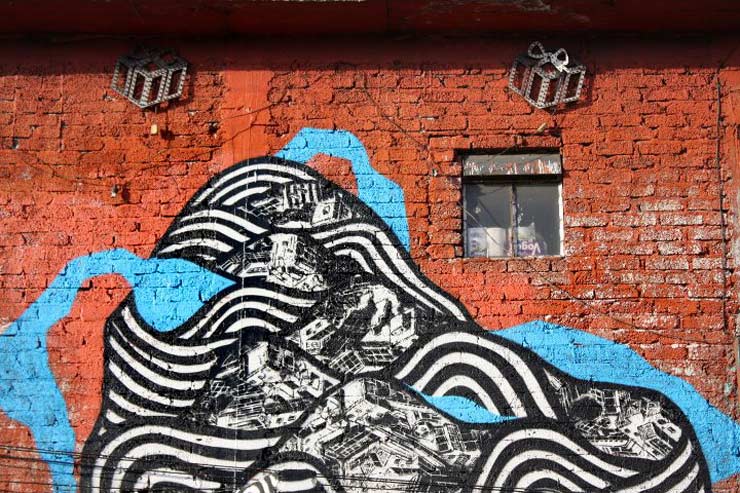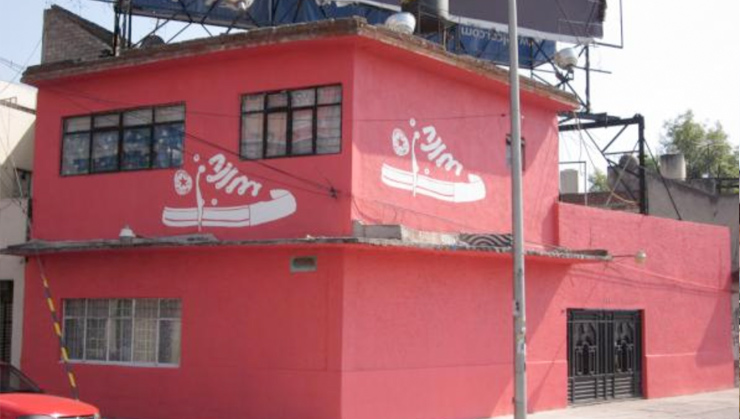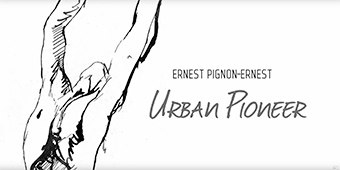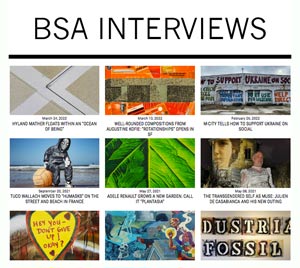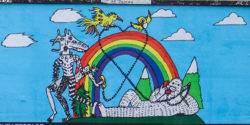Nobody expects to “run” forever. That’s the nature of Street Art and everything else. If your work is not gone over by another artist or buffed by a private or municipal roller, the rain and wind and sun will eventually erode your enthusiasm. That’s the nature of this ephemeral art.
Graffiti writers and Street Art makers are sometimes lulled into thinking their principle audiences are each other, but there is always the arm of the law and property owners, and more often than ever it is the arm of commerce that swings through and bats everyone aside with a message brought to you by a manly deodorant.
Last week Polish Street Artist M-City got his work buffed by sneakers.
He’d put it up last summer in the Gustavo A. Madero district in Mexico City completely legally as part of a cultural project. The trucks and scenes of industry he stenciled excited the local kids and paid tribute to the monsters that roar through the modest neighborhood. Using multiple layers of stencils, as he has done in cities like Warsaw, Jakaarta, Brooklyn, Los Angeles and Stavanger (Norway) in the last few years, M-City created his boldly dense geometry of the symbols of production on a red brick home in Colonia 7 de Noviembre.
The original state of the building in was not remarkable. (image courtesy M-City, Mamutt Arte, and Cauce Ciudano)
The organizers of the program which brought him there, Gonzalo Alvarez of Mamutt Arte and Carlos Cruz of Cauce Ciudano in Mexico City, have hosted Street Artists like ROA, Broken Crow, JAZ, EVER, Sego, Saner, XAM, Liquen and Dhear over the last two years to create cultural programs for at-risk youth and burgeoning young artists.
The M-City piece paid tribute to the businesses in the area. (image courtesy M-City, Mamutt Arte, and Cauce Ciudano)
“Obviously I was super angry at the house owners, but I understood that a little extra help in these tough times is always good,” explains Alvarez as he describes his initial reaction to seeing M-City’s work replaced by a flat one color illustration of a sneaker. It raised his ire at the company that showed no sensitivity to the efforts of the neighbors, but he wasn’t sure what he wanted to do about it. “It took me and the Cauce people like three days to kind of understand if the brand was wrong or we were wrong.” Ultimately they decided to write a two-page letter to Converse to raise awareness there about the impact it’s had.
The M-City work going up last August. (image courtesy M-City, Mamutt Arte, and Cauce Ciudano)
In their letter they explain that their joint project has worked closely with local community, civic, and international organizations to create their program, “painting in areas with problems of violence and delinquency (painting on peoples houses and businesses) … a space where gangs can coexist without violence, helping to build peace, we show that this expression can become a job and a piece of art.”
Local youth participated in the mural’s creation and passed it daily. (image courtesy M-City, Mamutt Arte, and Cauce Ciudano)
Since sending the letter to Converse Mexico offices and to media in the Street Art community, Alvarez and Cruz have received a lot of feedback. “All of the opinions we have received via different ways (Twitter, Facebook, blogs, phone calls, etc) are sympathetic to our point of view and understand exactly where we are coming from, even if they are not even interested in art.”
The stencil artist draws upon a collection of approximately one hundred hand cut stencils. (image courtesy M-City, Mamutt Arte, and Cauce Ciudano)
You can’t characterize art on the street as anything less than an ongoing conversation; which includes all the subtleties and ramifications the metaphor implies. In this case, it looks like there will be more to say.
The new facade. (image courtesy M-City, Mamutt Arte, and Cauce Ciudano)
Other Articles You May Like from BSA:
"The mosaic is like a puzzle, and in its smallest parts lies the whole."Gustav Klimt (1862–1918) More durable than a mural, the mosaic has proved to be a cherished member of the Street Art family ...
Our weekly focus on the moving image and art in the streets. And other oddities. Now screening:1. Don't Choose Extinction - UNDP | United Nations | Jack Black | Climate Action.2. Os Gemeos: Se...
Our weekly focus on the moving image and art in the streets. And other oddities. Now screening:1. Thomas Medicus / Human Animal Binary (2 Parts) 2. Tuco Wallach Pacifico / Lapinou Proje...
Welcome to BSA Images of the Week. If you are not seeing opinions and theories being expressed on social media or raging cable, you can always go to the streets today, as the voice of the peo...
New York is a Zoo. How many times have you heard that? The animal kingdom has nothing on our subways, which can present a parade of species at all hours, from the scaley to the furry to the creat...
 BROOKLYN STREET ART LOVES YOU MORE EVERY DAY
BROOKLYN STREET ART LOVES YOU MORE EVERY DAY